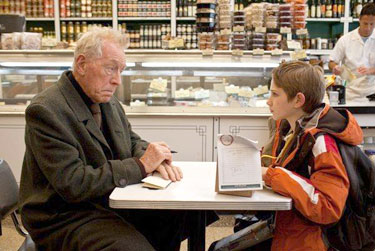I can't give Extremely Loud and Incredibly Close a chance. It's bullheaded and downright selfish of me, but I just can't do it. Seconds into the film's opening credit sequence, when a falling man flails in slow motion against a clear blue sky, any possibility of my evenhanded criticism vanishes. I won't abide Sept. 11 exploitation in art – and this damn thing leads with it.
Adapted from the Jonathan Safran Foer novel of the same name, the film follows Oskar Schell (Thomas Horn), a precocious boy genius who loses his father, Thomas (Tom Hanks), during the World Trade Center attacks. A year later, while his mother (Sandra Bullock) continues to mourn, Oskar discovers a key hidden inside a vase in his father's closet, wrapped in an envelope labeled ''Black.'' Drawing on past ''expeditions'' – the projects Thomas concocted to channel his son's intellect toward social development – Oskar assumes that the key's lock hides some unknown, final treasure. So, he looks up every known Black in New York City and starts knocking on doors.

Extremely Loud and Incredibly Close
If that sounds overly precious, that's because it is. While Foer elevated those quirks on the backs of a thoughtfully detailed characters and a carefully woven history that touched upon the Holocaust and the firebombing of Dresden to consider Sept. 11, director Stephen Daldry picks only the strongest visual cues, with their purposes rarely included. In this Extremely Loud, there's no reason to explain Oskar's tambourine affectation, or the convoluted history between his grandmother (Zoe Caldwell) and "The Renter" (Max von Sydow) living in her spare bedroom, or why that renter has taken a vow of silence, only communicating through handwritten notes and the "Yes" and "No" tattoos on his palms.
From that first frame, though, Daldry seems wholly invested in attempting to depict the World Trade Center attacks with an artist's respect, however misguided or unintentionally painful that may be. While he uses footage of the towers sparingly and only when he deems necessary, I nevertheless felt a hitch in my stomach every time they appeared on screen. I felt manipulated.
This, of course, makes me a hypocrite. I don't have the same guttural distaste for war epics or heart-wrenching documentaries or any of that ilk; in fact, I enjoy watching the lot of them. Mine, here, is a visceral reaction, magnified in uncomfortable detail through Extremely Loud. I was about Oskar's age in 2001, and while watching his story, I couldn't wrench my feelings from the ones Daldry so shamelessly mines. Where others might see tender melodrama between Horn and von Sydow, I only want to cry foul. When others might actually cry, I'm furiously sad. It's fine to pick at scars that haven't bled in years, but that blood needs to be spilt for something meaningful.
Foer's novel, for example, was reason enough to bleed. So was Bruce Springsteen's The Rising. Same goes for Spike Lee's thoroughly excellent The 25th Hour, perhaps the only film yet to tackle Sept. 11 and emerge the better for it. But don't believe for a second that Daldry's Extremely Loud is intended to be anything but entertainment. It doesn't make you think or question. It doesn't challenge you. It milks your tears, only to step away, giving you a sterile space to compose yourself. It's emotional manipulation of the most condescending order.
EXTREMELY LOUD AND INCREDIBLY CLOSE Starring Sandra Bullock, Tom Hanks, Thomas Horn Rated PG 129 Minutes Opens Jan. 20 Area Theaters
Starring Sandra Bullock, Tom Hanks, Thomas Horn Rated PG 129 Minutes Opens Jan. 20 Area Theaters
Of course, it can't all be bad news. Horn, who Daldry discovered on an episode of Jeopardy! Kids, is a decidedly strong and believable Oskar. That he's asked to carry such a star-heavy movie in his acting debut, then somehow does it, is a sign of his talent – and also that of Daldry's, whose direction had the same effect on Billy Elliot. Von Sydow pulls off a cheerfully good performance in a poorly sketched role, his eyes revealing more than most of his cast mates can even manage with dialogue. In her final scenes, Bullock salvages what had been a grisly effort to be anything but a caricature of widowed spouse. And sometimes, maybe just one time, the montages of New Yorkers that appear again and again break through contrived purpose to reveal some heartening truth about America and those days after Sept. 11.
Or maybe I just succumbed to Daldry's barrage of emotional brinksmanship. I can't honestly say either way. And that's perhaps the most troubling thing: Extremely Loud suffers a fate of its own cloying, manipulative design, but I suffer that of mine too. The truth is, I'm not entirely sure where one stops and the other begins.
...more